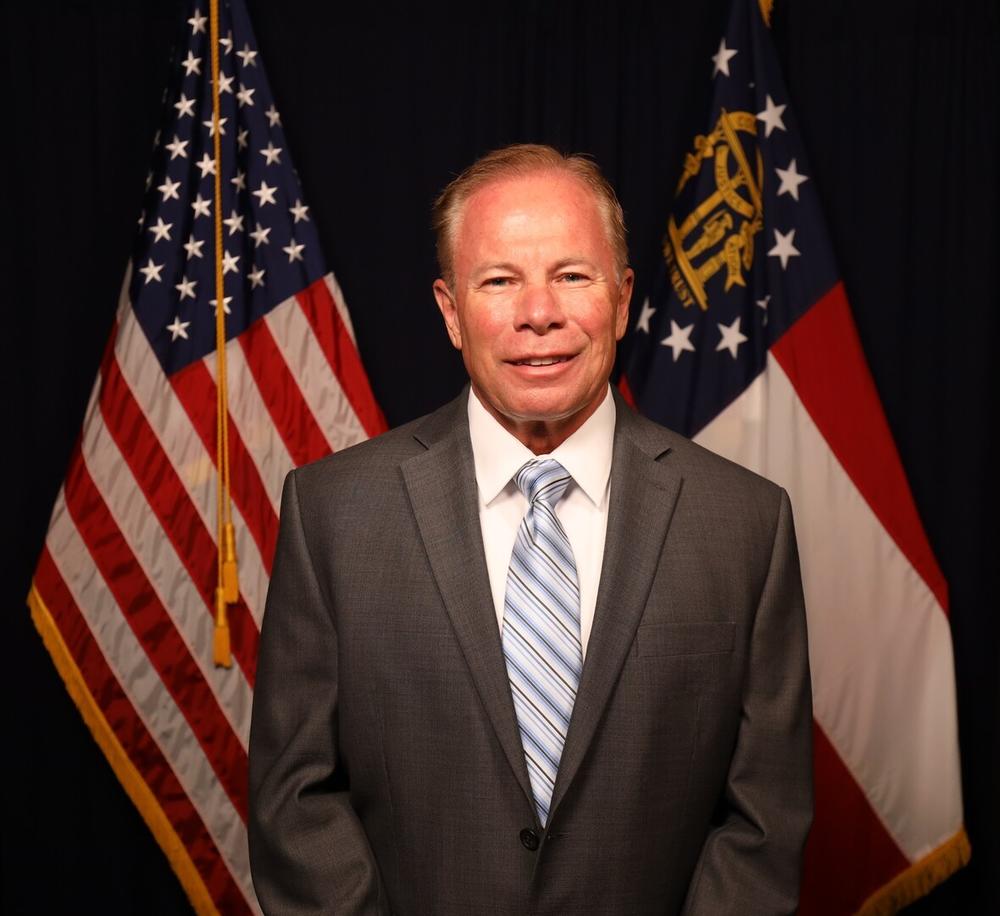
Section Branding
Header Content
Georgia Today: Teacher reads book and faces discipline; Protesters or terrorists; Cephalopod Week
Primary Content
On the Friday, June 23 edition of Georgia Today: A Cobb County teacher faces discipline for book covering 'divisive concepts'; protesters get labeled — and charged — as domestic terrorists; and "Cephalopod Week" is coming

Peter Biello: Welcome to the Georgia Today podcast from GPB News. Today is Friday, June 23. I'm Peter Biello. On today's episode, a Cobb County teacher is under scrutiny for addressing divisive concepts in the classroom, protesters say the state's domestic terrorism law is being used to scare them into silence, and in honor of Cephalopod Week, we'll tell you what you need to know about the super-smart invertebrates. These stories and more are coming up on this edition of Georgia Today.
Story 1
Peter Biello: Drug overdose deaths in Savannah's Chatham County so far this year are double what they were at the same time last year. That's according to the county's counter-narcotics team. Its director, Michael Sarhatt, told the county commissioners this morning that so far this year, 46 people in Chatham County have died from drug overdoses compared to 23 a year ago.
Michael Sarhatt: We're working as hard as we can enforcement-wise to get as much of that off the street and the number of investigations that we're doing on a daily basis that don't include fentanyl are slim.
Peter Biello: Fentanyl found in drugs like cocaine and counterfeit pills is causing a spike in opioid-related overdose deaths statewide and nationally. Sarhatt says his agency is fighting the epidemic through education, especially about the overdose-reversing medication naloxone.
Story 2
Peter Biello: A teacher in metro Atlanta's Cobb County could be the first educator in Georgia to face discipline under laws passed last year addressing so-called divisive concepts in the classroom. The local school district placed elementary school teacher Katie Rinderle on administrative leave after she read fifth graders a rhyming book challenging gender assumptions. Jeff Hubbard of the Cobb County Association of Educators says the new laws could ruin the career of an exemplary educator.
Jeff Hubbard: You're not going to get a job in the state of Georgia when you have to put "terminated" on your application for any other county. And because the hearing is not until August 3rd, she's basically in limbo until then. And what it would have to be, what that would have to be a Georgia school system, public school system, that would be willing to hire her, even though Cobb has fired her because they're saying she broke this policy. For reading a book that her children chose for her to read. And it sends a horrible message: Anything that touches the diverse — issues of diversity, of equity and equality or inclusion? Stay away from it or else.
Peter Biello: Rinderle has retained a lawyer to fight her planned termination. A Cobb County School district spokesperson did not respond to a request for comment.

Story 3
Peter Biello: The director of the Georgia Bureau of Investigation is leaving his position less than a year after he took it. Cobb County officials announced yesterday that Mike Register plans to return to his job as the county's public safety director. Gov. Brian Kemp tapped him to lead the state's top law enforcement agency last August. Register will remain at the GBI through July. An announcement on his successor is expected to come later.

Story 4
Peter Biello: Protesters are planning demonstrations this weekend to show their opposition to the public safety training center planned for a forest in Southeast Atlanta. It's part of what they're calling a week of action. At the last week of action, nearly two dozen people were arrested and charged under the state's domestic terrorism law. Some protesters say that charge is being used to scare them into silence. Priscilla Grim lives in New York City now, but she was born in Atlanta's Northside Hospital. She has Georgia roots and says she loves this area. From a phone in the DeKalb County jail, she told me how the South River Forest drew her back.
Priscilla Grim: When I heard the call to camp in the woods to literally save the trees, who wouldn't answer that? If you love nature and know how important it is for us on this planet.
Peter Biello: The call came from opponents of the proposed Public Safety Training Center who'd been camping there for months, and she was in the forest in March when a peaceful concert took a turn. Some protesters, many wearing black, chased police, threw rocks and Molotov cocktails, and set fire to construction equipment. On the advice of her lawyer, Grimm won't share many details of her experience, but she remembers the moment.
Priscilla Grim: I was arrested with a gun to my head. Like what?
Peter Biello: And then she was charged with domestic terrorism. Grim spent a month in the DeKalb County jail. When we next spoke on Zoom, she had been released on bond. She says the charges are ridiculous.
Priscilla Grim: Nobody is a domestic terrorist. Even if people did throw rocks? That's not terrorism. Is that terrorism? I mean, Honestly, is it?
Peter Biello: Scholars and politicians have spent decades debating what terrorism is. Georgia's law captures a common area of agreement: murder meant to scare people into behaving differently. But it also includes something more subtle: the destruction of critical infrastructure to advance a belief. And the law leaves room for prosecutors to define critical infrastructure. That bothered former Rep. Bob Trammell and other Democrats when Republicans passed it more than five years ago.
Rep. Bob Trammell: The definition of "critical infrastructure" was certainly a central piece of the objection that we had because it was so expansive that it could be used to capture almost anything.
Peter Biello: A similar domestic terrorism bill in Oregon narrowly defines critical infrastructure as things like utilities, data centers and public roads. Republican state Sen. Bill Cowsert, who pushed for Georgia's law, didn't respond to our request for comment. The Georgia Bureau of Investigation, which charged Priscilla Grim and other protesters with domestic terrorism, declined to comment. The DeKalb County DA's office also declined, but then handed the prosecutions over to the office of Georgia Attorney General Chris Carr. Carr could not be reached for comment before deadline. Prosecutors could have brought other charges, says David Byman, professor of security studies at Georgetown University. But he says these charges are a powerful tool for prosecutors.
David Byman: It's a harder sell to a jury to say, you know, "Find this person is innocent," if terrorism is floating in the air
Peter Biello: Meanwhile, protests continue under the law's shadow. Outside the DeKalb County government offices in Decatur this spring, protesters gathered for a sit-in. Mariana Satterly of Atlanta was among them.
Mariana Satterly: If you look around, you see sweet signs, a banjo. Somebody brought coffee. Other folks reading, you know, it's it's a nice morning, so the risk is a little bit less.
Peter Biello: Less, but not zero. Satterly says they're aware of police officers watching them nearby. They say these domestic terrorism charges are an obscene overstep.
Mariana Satterly: That's a certain kind of law enforcement and it looks more like intimidation and repression. It's textbook intimidation and repression.
Peter Biello: But for other protesters, the law changes nothing. Kendall Berry lives in Atlanta.
Kendall Berry: I mean, it doesn't really factor it too much other than I think like it made me want to do it more just because we're clearly not domestic terrorists. And I would like for people to see that.
Peter Biello: But even being accused of domestic terrorism has consequences. Priscilla Grim lost her job at Fordham University. She says she's now looking for a new one.
Priscilla Grim: I have more time on my hands and I can be an activist and hopefully a writer.
Peter Biello: Grim is raising money to fight the charges, which she says is slow going and frustrating. It's unclear when she'll be back in court. If convicted, she could spend years in prison. And as we mentioned, DeKalb County District Attorney Sherry Boston says her office is withdrawing from the prosecution of all current cases related to the controversial Atlanta Public Safety Training Center. In a statement today, the DA's office says there's a, quote, "fundamental difference in prosecutorial philosophy" between the DeKalb County and state law enforcement agencies prosecuting the cases. The DA's office declined requests to elaborate. In total, more than 40 people have been arrested in the past year on domestic terrorism charges stemming from protests. And three others have been arrested on charity fraud and money laundering charges.
Story 5
Peter Biello: A South Korean auto parts supplier plans to build a $72 million manufacturing facility in metro Atlanta's Henry County. NVH Korea said yesterday that it plans to hire 160 workers at the site designed to build battery components. It's the latest Georgia jobs announcement to come from the electric vehicle sector since Hyundai, SK On, and Rivian announced projects in the state over the past two years.

Story 6
Peter Biello: State officials are breathing a sigh of relief as bald eagle surveys show the iconic raptors are nesting and fledging young at healthy rates this year. The Georgia Department of Natural Resources said this week that nesting success was average to above average in areas surveyed. Places surveyed include coastal areas where avian flu hammered eagles last spring.

Story 7
Peter Biello: Today marks the start of the annual Cephalopod Week. This year, Science Friday is partnering with GPB to help celebrate the ocean's super smart invertebrates. GPB's Grant Blankenship spoke with Science Friday's Ira Flatow about octopuses and squids to find out what makes cephalopods so great.
Grant Blankenship: I think of Cephalopod Week as a tradition at this point, and I'm always excited when I hear it pop up on the radio every year. How — how did you even start this and why?
Ira Flatow: Yeah, it is a tradition. I think we're like in our 10th year of this. It started in a very interesting way. About 10 years ago, Flora Lichtman, our video producer at the time, created a video called 'Where's the Octopus?' where marine biologist Roger Hanlon, he's scuba diving and stumbles literally on a camouflaged octopus. And it just scares him, grabs onto his mouthpiece. And it was amazing video. We put it up on YouTube, it's got about 600,000 views now. And when we saw this video, we said, 'Hey, you know, there's this thing called "Shark Week" on that other channel. Why don't we celebrate a much brainier, more interesting kind of animal — the cephalopods, squid, octopus, cuttlefish or nautilus — which are magicians of disguise and a lot smarter than sharks? So we'll have our own "Cephalopod Week."' And that's how it happened.
Grant Blankenship: They are super smart, and so various in their forms. Are those the things that make them such a great entree for people into literally the rest of the world of science? Is that why this sticks?
Ira Flatow: Well, you know, what's interesting about them, why it sticks, I think, is because they're so surprising. There was a famous story where a marine biologist had octopuses in his tanks, and every night he would shut the lights off and in the morning he'd come back and there was a fish missing from one of the tanks on the other side of the room, and he couldn't figure out what was going on. So one night he closed the lights, shut the door and stayed in the room, and he watched an octopus sneak up out of the tank, crawl on the floor all the way over to the other side of the room, go up into the tank, go fishing, steal a fish, and go back into his home. So how could you not love that?
Grant Blankenship: How could you not love that? Exactly. Did you see that story recently about the scientist who thought he was watching an octopus in his lab have a nightmare?
Ira Flatow: I did. I saw that story, and I thought it was crazy, right? I mean, you watch it sort of sleeping, and then it starts going into wild contortions. And in the middle, just about halfway through, it inks itself — lets out this big ink, which we all know is its defense. So maybe it had a nightmare about it being attacked. Of course, we don't know if octopuses even dream, much less have nightmares. So it was really, really interesting. And it's, it's more — it adds to the lore about the cephalopod.
Grant Blankenship: So for the cephalopod-curious who are maybe landlocked and can't scuba dive, what's the best way for us to engage with them? How do — how do we get close contact with these animals?
Ira Flatow: Well, you know, there are aquariums that have cephalopods in them and they allow you to, you know, get up close and personal with them. You don't want to — you don't want to hurt them, I mean, and the aquariums won't allow you to do this. But, you know, if you can't get to the cephalopods, go to the petting zoos in the aquariums and — and react with those animals that they can allow you to touch.
You could become a scuba diver and you could go underwater and look for an octopus. The dive masters know where they live. I found one when I was diving. The dive master took me to the pilings in a pier. Because octopuses — octopi, whichever you prefer — are nocturnal, they like to come out at night. And he beckoned me over to this octopus, and I swam over. And he had one in his hand. He's gesturing to me, 'Hey, come, come, feel this.' And I'm sort of afraid because I've never touched an octopus. But he took the octopus and he sort of tilted his hand and it went into my hand. And you know what? I could hardly feel it because it's probably 98% water. And I'm in the water, so I'm just gently touching it. And it was one of the great moments of my diving experience. And I think that's the best way: It's to go out and go learn how to scuba dive and go see them in their natural habitat because they will do things in their natural habitat that you won't see them do in captivity because they're at home out there and there they're the boss.
Grant Blankenship: What research are you watching most curiously? What's — what's the stuff that you're looking forward to scientists telling you that you want to know about these animals?
Ira Flatow: Well, you know, climate change is here. Global warming is happening. That means the oceans are getting warmer. And when the oceans get warmer, a lot of different stuff happens. When the oceans get full of carbon dioxide — they really suck up a lot of CO2. And when you suck up CO2, it turns into an acid in the water. So it's like if you have soda water: If you bubble CO2 through the soda water, you're actually creating an acid. The water gets more acidic. And that's bad for all sea creatures because they're not used to living in acidic water and they're not used to living in warming water. And it doesn't take much warming in an ocean to affect the marine life there. We're talking, you know, a fraction of a degree. So, so many researchers are looking into how climate change is affecting all the animals in the water. And the octopi and the cephalopods are certainly part of that family. We won't know what's going to happen.
Grant Blankenship: For folks who come see Cephalopod Week in Atlanta at our studio, what can they expect? How is how is this experience going to be different?
Ira Flatow: It's going to be. It's going to be a lot of fun. We always have fun at these. OK, so the audience is going to hear from two really amazing local experts. Emily Green is an aquarist from the nearby Georgia Aquarium with almost 10 years of experience caring for cephalopods and sea jellies, turtles, under — other underwater creatures. And then we have Nicole Johnston, a biology lecturer at Spelman College who teaches about coral reefs and ocean acidification due to climate change. Plus the audience. I love this: The audience can ask them questions. And you know what happens? I have to I have to warn the audience in advance because this happ- — we do this a lot — when we get to a Q&A period and we ask people for questions? People are shy about going up to the microphone and you know what happens? The kids get there first.
Grant Blankenship: As they should.
Ira Flatow: Yeah. A 9-year-old is going to muscle you out. And if you want to get a question in, make sure you get there early because —they ask the best questions. So that's actually the best part, is the Q&A part. I love that.
Peter Biello: And that is it for this edition of Georgia Today. If you want to learn more about any of these stories, visit GPB.org/News. And don't forget to subscribe to this podcast. We'll be back with you and your podcast feed on Monday afternoon. And as always, if you've got feedback or a story idea, we want to hear from you. Send us an email. The address is GeorgiaToday@GPB.org. I'm Peter Biello. Thanks again for listening. We'll see you tomorrow.
___
For more on these stories and more go to GPB.org/news.
Also, GPB's Georgia Today newsletter hits your inbox on Tuesdays, Wednesdays and Thursdays with top stories from around the state featuring news, politics and more. Subscribe here.



